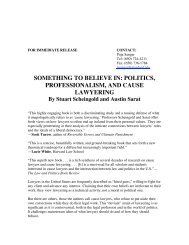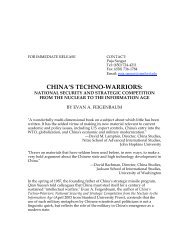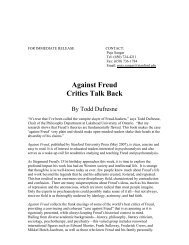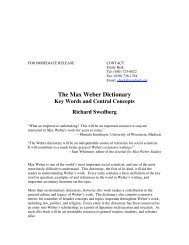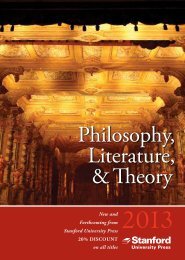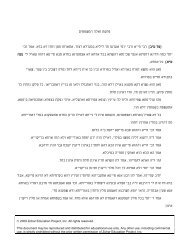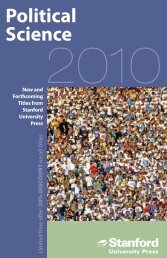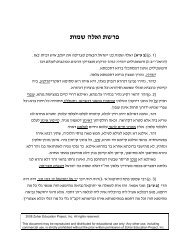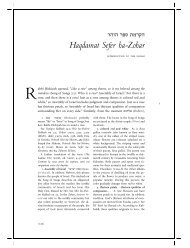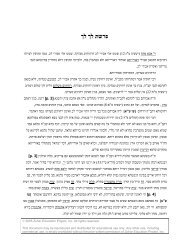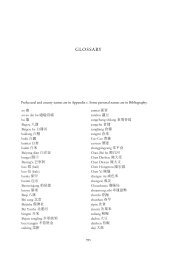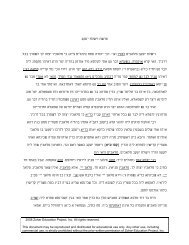Front Matter (PDF) - Stanford University Press
Front Matter (PDF) - Stanford University Press
Front Matter (PDF) - Stanford University Press
You also want an ePaper? Increase the reach of your titles
YUMPU automatically turns print PDFs into web optimized ePapers that Google loves.
One divorced Adam, or not.'' 37 As the rabbi demonstrates by exegetical<br />
Holy<br />
the mystical meaningis the shockingalternative lurkingwithin that<br />
arti®ce,<br />
phrase, ``or not'': Adam drove out, divorced Shekhinah, splittingHer from<br />
bland<br />
divine partner, Tif'eret, and from himself. Once, as Adam, humanity was<br />
Her<br />
to God. The original sin lies in losing intimacy with the divine, thereby<br />
wedded<br />
constrictingunbounded awareness. This loss follows inevitably from tasting<br />
fruit of discursive knowledge; it is the price we pay for maturity and<br />
the<br />
The spiritual challenge is to search for that lost treasureÐwithout<br />
culture.<br />
self or the world.<br />
renouncingthe<br />
you read, see how the Ḥavrayya coax new meaningout of a biblical verse,<br />
As<br />
wordÐor even letter. Often, they rely on standard rabbinic techniques<br />
phrase,<br />
interpretation, such as verbal analogy: ``Here is written: [such-and-such a<br />
of<br />
expression], and there is written: [an identical (or nearly identical)<br />
biblical<br />
implyinga close link between the two expressions.<br />
expression],''<br />
hermeneutical leap may be long, far from the literal meaning, but<br />
The<br />
a verse is read ``hyperliterally,'' ignoring idiomatic usage in favor of<br />
sometimes<br />
lekha), Go forth, . . . to the land that Iwill show you (Genesis 12:1), Rabbi<br />
(Lekh<br />
insists on readingthe words more literally than they were intended:<br />
El'azar<br />
lekha, Go to yourself! 38 Search deep within to discover your true self.<br />
Lekh<br />
startlingillustration is the Zohar's readingof the openingwords of<br />
Another<br />
Torah, traditionally rendered: the n the beginning God created. Everyone<br />
assumes the verse describes the creation of the world, but for the Zohar it<br />
I<br />
to a more primal beginning: the emanation of the se®rot from Ein Sof<br />
alludes<br />
How is this allusion discovered, or invented? By insistingon<br />
(``In®nity'').<br />
(Be-<br />
bara Elohim), construed now as With beginning, It created ElohimÐthat<br />
reshit<br />
by means of Ḥokhmah (the se®rah of ``Wisdom,'' known as beginning), It<br />
is,<br />
Ein Sof) emanated Binah (the se®rah of ``Understanding,'' known by<br />
(ineffable<br />
divine name Elohim). 39 God, it turns out, is the object of the verse, not the<br />
the<br />
The ultimate divine reality, Ein Sof, transcends and explodes our comfortable<br />
subject!<br />
conception of ``God.'' The Zohar dares us to confront this reality, as it<br />
as you undertake this adventure, expect to be surprisedÐstay alert. The<br />
So,<br />
teachings are profound and intense; one who hopes to enter and<br />
Zohar's<br />
in peace should be careful, persevering, simultaneously receptive and<br />
emerge<br />
The message is not served to you on a platter; you must engage the text<br />
active.<br />
Zohar 1:53b.<br />
37.<br />
Ibid., 78a.<br />
38.<br />
Translator's Introduction<br />
L LN N<br />
xviii<br />
a radically spiritual sense. For example, when God commands Abraham,<br />
readingthe Hebrew words in their precise order:<br />
O KFNB<br />
BZC<br />
\K[BZC<br />
transforms the familiar story of Creation into divine biography.<br />
39. Ibid., 15a.



